On an otherwise quiet afternoon, Oakdale Avenue in Bayview Hunters Point was filled with the sounds of laughter, chatting and mingling. That’s because every Friday at 1 p.m., roughly 40 neighbors gather at a small food pantry in front of their apartment complex to pick up groceries and hang out. Across the street, vibrant murals painted by local youth adorn a large building and its stairway, and a community 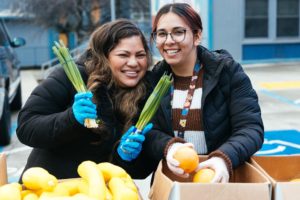 garden sits at the top of the stairs.
garden sits at the top of the stairs.
The common thread here is San Francisco Housing Development Corporation (SFHDC), a nonprofit and longtime Food Bank partner that builds affordable housing, provides financial empowerment services, and invests in the growth and development of Black entrepreneurs in historically Black corridors of San Francisco. They also offer supportive services for residents, including a weekly food pantry with groceries like green onions, rice, grapefruit, sweet potatoes, avocadoes, and squash provided by the Food Bank.
Securing Stability
SFHDC’s multi-pronged approach is crucial for securing housing and financial stability for the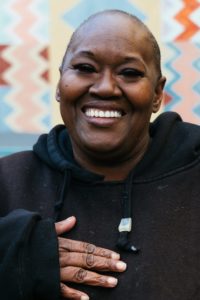 community – but that’s not all.
community – but that’s not all.
“We’re here to not only keep affordable housing in San Francisco, but to ensure and enrich the fact that we want to keep the African American community [of San Francisco] here,” said Taylor Booker, Associate Director of Resident Services and Community Engagement at SFHDC.
For one resident Nicole, financial literacy workshops put on by SFHDC helped her pay back-due rent on her apartment – and now she gives back, too. On top of caring for her three grandchildren, she volunteers at the pantry every Friday and sits on the Board of the Tenants Association. “Oakdale’s the only pantry that’s open [in this area], so I tell all my residents to come out. And I love volunteering – it gets me out of the house, and we get to know our neighbors in the community,” Nicole shared.
Healing in Community
SFHDC also manages the building across from the pantry, which houses other local organizations including Dev/Mission, City of Dreams, and the Phoenix Project. There’s a variety of services available to transitional age (14-24) youth in the neighborhood – and they extend far beyond the employment, education, and housing support one might expect, thanks to leaders like Kiani Shaw.
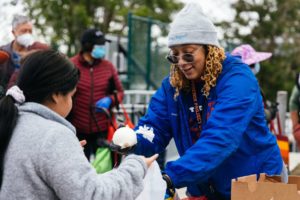 Kiani, a life coach at the Phoenix Project and a regular pantry volunteer, says that “a lot of the work I’ve been doing here with the youth is healing. How do we address the traumas that we’ve been through and how they’ve impacted us? How do we transform that into something more productive or conducive to your success?”
Kiani, a life coach at the Phoenix Project and a regular pantry volunteer, says that “a lot of the work I’ve been doing here with the youth is healing. How do we address the traumas that we’ve been through and how they’ve impacted us? How do we transform that into something more productive or conducive to your success?”
This emphasis on healing and transformation is interwoven throughout the work of community advocates and activists – including SFHDC Resident Services Assistant Travis Moananu.
The X-Factor? Trust
“This is where my heart is,” Travis told us. He’s talking about San Francisco in general – Travis was born and raised in Potrero Hill and has been a resident of Bayview Hunters Point for the last 15 years – but the Oakdale pantry seems to fit the bill, too. Folks lit up when he arrived, with neighbors calling out,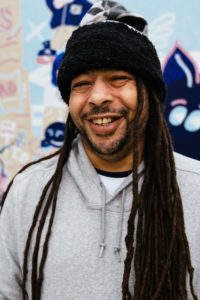 “Hey Trav!” or “My friend!”
“Hey Trav!” or “My friend!”
As a community activist and Resident Services Assistant with SFHDC, Travis’ ease and familiarity with his neighbors is irreplaceable – because trust and healing go hand in hand. “The asset that a community member can bring to an organization who’s serving the community is huge. You can’t teach what I know. They don’t have a college course for this. I lived it, I know it, I am it.”
To Travis, having readily available, fresh produce at the food pantry is the perfect way to show his neighbors that “not everybody who comes into the community has ulterior motives. Some of us really want to help. When people can see there are organizations and people who want better for the community, I think the community will become better.”
Visibility, Transformation, and Future-Building
“I think people are starting to learn and understand how powerful that can be, for the community to see a community member change their life and be able to do things different,” Travis mused towards the end of our conversation. His own life has had a series of ups and downs, and the fulfillment of becoming an 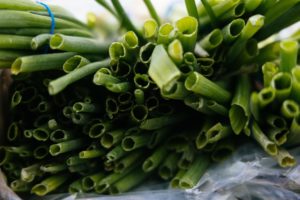 activist and advocate is something he never saw coming. With the trust of the community on one hand, and new connections to resources on the other, he’s the “perfect bridge.”
activist and advocate is something he never saw coming. With the trust of the community on one hand, and new connections to resources on the other, he’s the “perfect bridge.”
“We need to see us helping us. We need to see people who look like me. That way, the kids can say, ‘Okay, well, he did it. He got out.’ I can’t really change what my past was. But I can dictate my future. My future is to help, my future is to give back, and my responsibility is to communities like this.”
Support SFHDC
Learn how they're building stability in historically Black corridors of San Francisco
Check them out!


Share